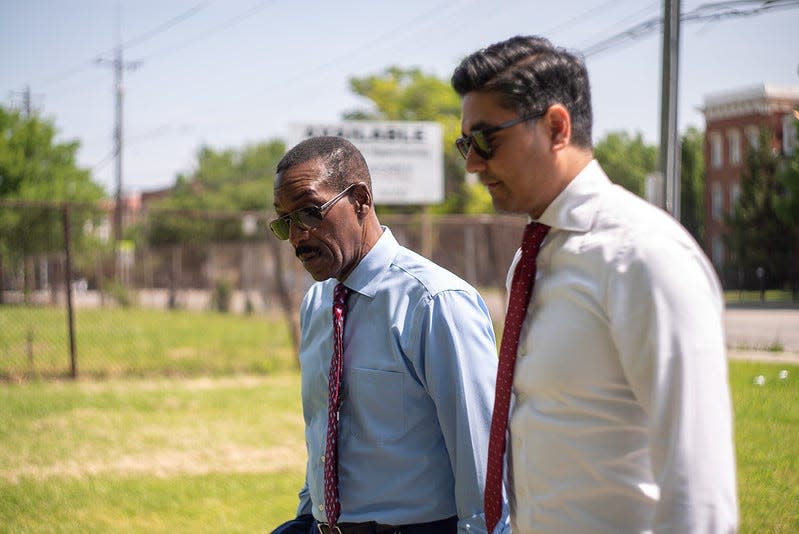Cincinnati leaders to apologize for destruction of Black neighborhood in 1950s
- Oops!Something went wrong.Please try again later.
More than a half century after Cincinnati's leaders razed one of the city's largest Black neighborhoods to make room for a highway, Mayor Aftab Pureval and two council members say they will apologize.
They and other community leaders said the apology, expected at a press conference Tuesday, is a first step toward "reconciliation" with former residents of the lower West End, previously known as the Kenyon-Barr district that once was home to about 10,000 Black families.
Pureval, Vice Mayor Jan-Michele Lemon Kearney and Councilman Scotty Johnson said in a statement announcing the apology that the decision in the 1950s to tear down Kenyon-Barr to make room for Interstate 75 and a new business district in Queensgate was "rooted in institutional racism."
They said the city didn't keep its promise to find new housing for the displaced families and destroyed many of the cultural, political and social networks that once thrived in Kenyon-Barr. Thousands of former residents of the district ended up in housing projects or substandard rental units in the West End, Over-the-Rhine and Avondale.
Their press release about the announcement said they and other members of city council will express "sincere regret" and will initiate reconciliation to former residents of the city’s lower West End, their descendants, and to all Cincinnatians for the elimination of the lower West End community. Johnson said there are no specific plans about what would happen next.
But neither they nor their statement said what steps might follow the apology. They made no mention of new housing programs or compensation for families that were displaced in the 1950s.
Johnson told The Enquirer there has been no discussion of compensation, but he said "this is not the end."
"This is not just an apology," he said. "There is more work to be done."
Learning 'so it doesn't happen again'
The idea to apologize was Johnson's. "This has never been done," Johnson said. "It’s important for people to feel like they haven’t been forgotten. We have to do better about the lasting effects about the decisions we make."
Kearney said the decision to raze the neighborhood destroyed more than buildings and homes. "Family wealth and family legacies were just gone," she said.
Her father, a doctor, had his office displaced. He moved it to Avondale. "He was always sad about it," Kearney said.
"I think the apology is important," Kearney said. "This city is already committed to racial equity. This is part of that."
Pureval said apologizing now is important as the city embarks on large infrastructure projects like the Brent Spence Bridge.
"When we talk about all the transformational infrastructure projects, it is particularly important to remember the public policies that played a role in harming our black communities," Pureval said.
"The city has acknowledged the tragedy, but I am not sure it has taken responsibility and apologized," he added. "The importance is not just learning about our history, but learning from it so it doesn’t happen again."

Community activists and those who have studied the impact of Kenyon-Barr's destruction also will attend the announcement Tuesday.
One of them, Wendy Ellis, grew up in Cincinnati and is the executive producer of a documentary about Avondale, her grandparents former neighborhood. The documentary, "America's Truth: Cincinnati," focuses on how discriminatory policies isolated and marginalized the city's Black residents for decades.
In an interview with The Enquirer last year, Ellis said recognizing the nation's history of racism is essential to solving the problems it left behind.
"We can't begin to solve these gnarly problems," she said, "if we really aren't truthful with ourselves about the source."
This article originally appeared on Cincinnati Enquirer: Cincinnati leaders apologize for razing Black neighborhood

